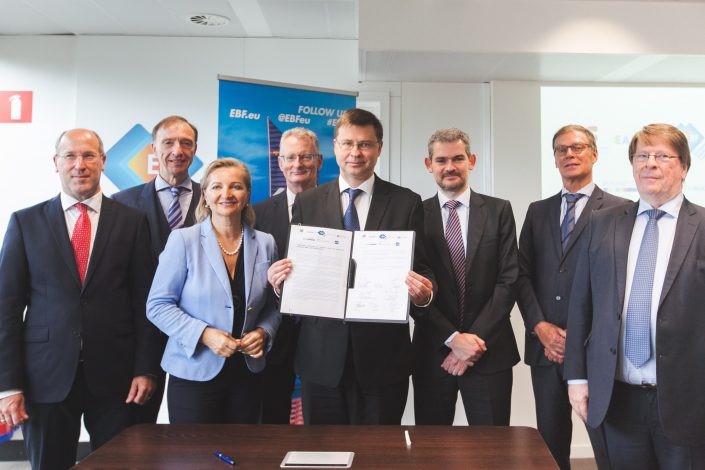
As the source of 70-80% of company financing in Europe, EBF members care deeply about supporting companies’ growth. European banks help entrepreneurs, family businesses and local and multinational firms access financing tools of different kinds adapted to their needs. In the face of a difficult decade for the global economy, the European banking sector has proven to be strong and resilient; loans to non-financial companies have risen above €10 trillion last year and continue to show a positive trend.
Banks are a core element of corporate finance in Europe. In addition to loans, they offer their customers a wide range of modern financial services, especially in the area of payments, export financing, risk management or in accessing the capital markets.
Globally operating universal banks are important partners for internationally active companies that need a full range of products and services in different countries. European structural and investment funds (from the EU or EIB, for example) are delivered most efficiently through the banking system, benefiting from the expertise, tools and the proximity of banks, also helping to leverage private finance especially for those SMEs with a short credit history, lack of collateral or a risk profile which to some extent keeps them out of the traditional financing.
Banks typically have close and long-term business relations with their corporate clients. This enables them to carry out informed risk analysis and cooperate with customers throughout the company life-cycle and beyond economic cycles. The bank performs a concrete intermediation function, matching financing needs with investment objectives.
These roles can be traced to tangible benefits in terms of jobs, exports, investment and sustainable growth for th future generations.
Small and medium-sized enterprises
 Banks are the main source of financing for SMEs, and their interests are better served by them, as they provide stability beyond economic cycles. What is more, the banking relationship – underpinned by proximity and the range of services – plays a central role in meeting SME needs. According to the latest ECB survey, SME access to bank lending has improved for the fifth consecutive year since 2012. While SMEs are served by a diversity of banks in some countries, the universal, private sector banks represented by the EBF accounts for a large share of SME financing across Europe.
Banks are the main source of financing for SMEs, and their interests are better served by them, as they provide stability beyond economic cycles. What is more, the banking relationship – underpinned by proximity and the range of services – plays a central role in meeting SME needs. According to the latest ECB survey, SME access to bank lending has improved for the fifth consecutive year since 2012. While SMEs are served by a diversity of banks in some countries, the universal, private sector banks represented by the EBF accounts for a large share of SME financing across Europe.
According to the SAFE survey on the access of SME to financing, the percentage of SMEs for which access to finance is the greatest difficulty, more than halved between 2009 when the survey was first organised and 2017 from 16% in 2009 to 7% in 2017.
Banks are also committed to give better feedback to SMEs, so they understand better what can be improved and which ways to obtain financing are available for them.
HLPs for Credit Applications
The European Banking Federation is a proud partner of the high level principles regarding the communication between SMEs and banks with regards loan applications together with four other European banking associations and endorsed by the Commission. The principles, developed in discussions with European SME organisations, aim at promoting high quality feedback on credit applications, enabling SME clients to better understand the reasons behind the bank’s decision.
The majority of SME applications for credit are successful. In fact, close to 80 percent of all requests are approved. However, higher rates of growth can be achieved by helping those SMEs which have not been successful understand better what they can do to obtain financing.
This shows a close connection with regards to the satisfaction with the financing received, only a small amount of EU firms (no more than 10% on average) are dissatisfied with it, be it in regards to quantity, duration, cost and collateral.

Brussels, 6 June 2017: The High-Level Principles on SME Credit Applications were presented. In the picture (from left to right): Wim Mijs, Chief Executive, EBF; Daniel Cloquet, Director, Business Europe; Ulrike Rabmer-Koller, President, UEAPME; Ian Talbot, Deputy President, Eurochambres; Valdis Dombrovskis, EC Vice President; Luca Bertalot, Secretary General, EMF-ECBC; Herve Guider, General Manager, EACB; and Chris De Noose, Managing Director, ESBG. Photo: Bogdan Hoyaux
Engagement with other relevant institutions
With regards to our engagement towards regulators, we are a usual contributor to the OECD work and standards with regards to Export Credits, engaging in the most pressing discussion on relevant issues, including the IWG, from a wide European perspective.

Useful links, resources & contacts
Links to EU projects and financing relating with SME financing – DG Growth, EASME, COSME, different EU funds in global terms
http://ec.europa.eu/growth/
https://ec.europa.eu/easme/en
https://ec.europa.eu/easme/en/cosme
https://ec.europa.eu/info/business-economy-euro/growth-and-investment/financing-investment/financing-programmes-smes_en
http://www.eib.org/projects/priorities/sme/index.htm
http://www.eif.org/EIF_for/sme_finance/index.htm
http://www.eif.org/what_we_do/efsi/
Links to European SMEs associations, other financing partners
Links to OECD and other international initiatives on business and SME finance & Export Credits.
http://www.oecd.org/cfe/smes/financing-smes-and-entrepreneurs-23065265.htm
Links to all relevant surveys and data presented, from ECB, EIB, EBF, Eurostat, EC – SAFE…
http://www.eib.org/infocentre/publications/all/econ-eibis-2017-eu-overview.htm
https://ec.europa.eu/growth/access-to-finance/data-surveys_en
https://www.ecb.europa.eu/stats/ecb_surveys/safe/html/index.en.html
https://www.ebf.eu/facts-and-figures/https://iccwbo.org/publication/icc-trade-register-report-2017/












